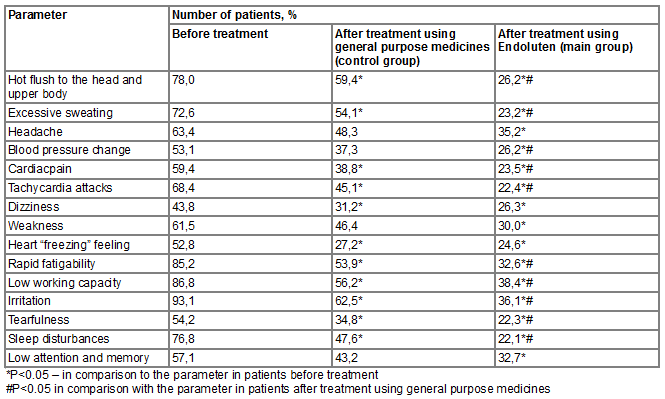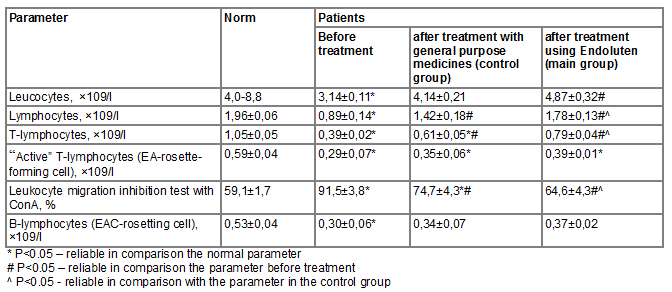The dietary supplement Endoluten contains a complex of low-molecular peptides with molecular weight up to 5000 Da, isolated from pineal gland (epiphysis) of young animals - calves aged up to 12 months. Endoluten is manufactured in the form of capsules with a content of active substance of 10 mg.
Endoluten
Experimental studies have shown that the peptides possess tissue-specific action on the cells of the tissues from which they were isolated. Endoluten peptides regulate metabolism processes in neuroendocrine cells of various tissues, including epiphysis, increase neuroendocrine system safety margins, having a favorable effect on the organism adaptation processes in extreme conditions; they possess anti-oxidative properties, regulating peroxide oxidation processes in various tissues. So it is possible to extrapolate an efficiency of administration of Endoluten for restoration of neuroendocrine regulation in case of its disorders of various origins. According to the results of experiments, Endoluten provides normalization of neuroendocrine regulation of basic functions of the organism.
It is well known, that decrease in functional activity of epiphysis results in decoupling of nervous, endocrine and immune systems, and provide development of various diseases and pathological conditions. An influence of extreme environmental, climatic-geographic, professional, psycho-emotional factors on human organism also results in neuroendocrine and immunological disorders, causing disadaptation disorders and psychosomatic diseases (3, 4, 5, 6).
Medicinal treatment of the diseases and pathological conditions includes application of various medicines, depending on symptoms of the disease. However the correction of the disorders is based on prescription of various medicines (1, 2):
• Adaptogens (ginseng, eleuterococcus, Rhaponticum carthamoides, Snowdon rose extracts, spikenard, devil’s-club infusions, saparal, pantocrin);
• Peptide immunomodulators (timalin, tactivin, timogen, mylopeptide);
• Epiphysis hormone (melatonin)
• Epiphysis peptides (epitalamin)
• Multivitamins etc.
However the drugs have side effects and cannot be prescribed for prevention of the listed pathological conditions. In this connection development of new effective and safe means for prophylaxis and increase in efficiency of treatment of patients with pathological conditions, related to neuroendocrine regulation disorders, is an pressing issue.
Clinical studies of Endoluten were carried out in 163 patients (including 48 men and 115 women) with dyshormonal myocardiodystrophy, physiogenic asthenia, mild and moderate climacteric syndrome in women and in oncological patients after the courses of radiation and chemotherapy, who have undergone a course of treatment at the Medical center of Saint Petersburg Institute of Bioregulation and Gerontology of the Northwest Branch of the Russian Academy of Medical Sciences from January 2011 to August 2011. Distribution of the patients by clinical entities, sex and age is shown in the table 1.
Table 1
Distribution of the patients by clinical entities, sex and age 
The patients were randomized into 2 groups, according to their clinical entity: control groups included 64 persons taking general purpose treatment for their diseases (1, 2). The patients with hormone replacement therapy were not included in the study.
The patients of the main group have been taking Endoluten in addition to the general purpose medicines - 1-2 capsules, 2-3 times a day before meal for 15-30 days depending on intensity of the pathological process.
Examination methods
Endoluten efficiency study was carried out on the basis of generally accepted examination methods. The patient complaints were assessed and compared; general clinical studies of blood and urine, biochemical blood test, electrocardiogram were carried out. The number and functional activity of peripheral blood lymphocytes were assessed using immunological methods. The hormone content (follicle-stimulating hormone and luteinizing hormone) in blood serum was determined using radioimmunological method. An assessment of psychophysiological parameters was made using correction task and Lüscher test.
Examination results
Endoluten administration in patients with dyshormonal myocardiodystrophy has resulted in improvement of subjective parameters of the disease, which resulted in decrease in the number of heart pain attacks, increase in working capacity and normalization of psychoemotional condition.
Table 2
Endoluten influence on the amount of hypothesis hormones in blood serum оf patients with dyshormonal myocardiodystrophy
Endoluten administration resulted in positive ECG dynamics. Determination of the level of hormones in the blood serum in patient of the basic group has helped to identify a decrease in the level of initial elevated FSH from 89,3±3,5 mU/ml to 46,8±3,9 mU/ml, while normal range is 1,5-45 mU/ml, and in patients of the control group only to 71,6±6,3 mU/ml, which is reliably lower than the parameter before treatment, however much higher than norm (table 2). The same tendency was observed in the LH content dynamics: in patients of the main group under Endoluten influence this parameter has decreased to normal values, while in the control group it has considerably decreased in comparison with the parameter before treatment, but was much higher than norm. Estradiol content, which was initially reliably decreased in female patients of both groups, has increased from 65,4±5,2 pmol/l to 101,3±7,2 pmol/l and was closer to the normal value (110-734 pmol/l), while in patients of the control group this parameter has elevated only to 79,1±4,2 pmol/l.
The study carried out has helped to identify corrective influence of Endoluten on hormonal disbalance, which resulted in normalization of metabolism in myocardium tissues, which has correlated with improvement of the clinical picture of the disease.
Same tendencies of normalization of the hormonal status were observed in patients with climacteric syndrome of mild and moderate degree: Endoluten results in restoration of the hypophysis hormone balance, which correlated with relief of main symptoms. The results of study of Endoluten efficiency in women with climacteric syndrome are shown in table 3.
According to the table 3, administration of Endoluten in patients with climacteric syndrome resulted in improvement of subjective parameters, which caused a reliable decrease in the number of pain attacks in comparison with the parameters before treatment, in the area of heart, dizziness, heart “freezing” feeling and sleep improvement. Besides it resulted in decrease in the number of complaints of tachycardia attacks, perspiration, hot flashes in the head and upper body, blood pressure fluctuation in comparison with patients before treatment and after treatment using general purpose medicines (table 3). After the course of Endoluten the patient have noticed considerable increase in working efficiency, which they related to normalization of psychoemotional condition. What stands out in the report is the fact, that the preparation effect was characterized by stable aftereffect. So in 1-2 month after the end of the course of Endoluten, the symptoms like dizziness, tinnitus, general weakness, sleep disturbances did not relapse.
Table 3
Dynamics of subjective parameters in patients with climacteric syndrome
Endoluten was also used for complex therapy of men with physiogenic asthenia. The preparation effected marked corrective action on the dynamics of subjective parameters. Men with physiogenic asthenia were complaining of general weakness, dizziness, high fatigability, decreased working capacity and sleep disturbances.
An addition of Endoluten to the treatment schedule of this category of patients resulted in elimination of objective symptoms, which resulted in fast and effective improvement of the general condition, while in patients of the control group, taking only general purpose therapy, the condition improvement was very slow and after the end of treatment subjective neurological symptoms have returned. It is significant that Endoluten treatment has marked aftereffect: after the end of application of the drug the improvement of the patient condition remained and was stable during the whole period of observation - no more than 1-3 month.
Thus Endoluten administration is a perspective direction for the therapy of pathological conditions connected to neurovegative function disorders, including climacteric syndrome, physiogenic asthenia, vegetative-vascular dystonia and other psychovegative disorders.
Oncological patients have been also taking Endoluten, they were the patients mainly with hormone-dependent tumors (breast cancer, cervical cancer and other locations), after surgical treatment and after courses of radiation and chemotherapy as a adjunct to the general purpose treatment. The patients were complaining of un-wellness, decreased muscular tone, decrease in appetite, apathy. Before treatment all the patients had changes of hemogram, mostly leucopenia and lymphocytopenia.
Table 4
Influence of Endoluten on immunological parameters of blood of oncological patients 
Endoluten administration in oncological patients of the basic group resulted in reliable increase in the total number of leucocytes, lymphocytes and T-lymphocytes of the blood, and improvement of functional activity of T-cells (table 4). The indicated changes were correlated with positive dynamics of subjective condition: appetite and sleep improvement, increase in the muscle tone, decrease in apathy.
The study results have shown that Endoluten is expedient in oncological patients after the courses of radiation and chemotherapy for improvement of the general condition, keeping an optimum level of hematological and immunological indices in peripheral blood, preventing a development of infectious complications.
Inclusion of Endoluten into the complex treatment of various diseases, related to neuroendocrine regulation disorders, does not result in any side effects, drug dependence, contraindications.
Thus the results obtained confirm treatment and prophylactic efficiency of Endoluten and expediency of its administration in complex treatment and prophylaxis of patients with various pathological conditions and diseases related to neuroendocrine regulation of the main functions of the organism.
Conclusion
The dietary supplement Endoluten normalizes metabolism in neuroendocrine system cells, in particular the pineal gland (epiphysis) and promotes restoration of neuroendocrine regulation and basic functions of the organism.
Endoluten is well tolerated by patients at oral administration; it does not result in any side effects and can be widely used as a treatment and prophylactic dietary supplement.
Recommended Endoluten dosage
· In patients with dyshormonal myocardiodystrophy - per os 10-15 minutes before meal 1-2 capsules 2-3 times a day for 15-30 days depending on severity of the pathological process.
· In patients with mild and moderate climacteric syndrome per os 10-15 minutes before meal 1-2 capsules 2-3 times a day for 30-60 days depending on severity of the pathological process.
· In patients with physiogenic asthenia - per os 10-15 minutes before meal 1-2 capsules 2-3 times a day for 15-30 days depending on severity of the pathological process.
· In oncological patients after radiation or chemotherapy - per os 10-15 minutes before meal 1-2 capsules 2-3 times a day for 30 days depending on severity of the pathological process.
· For prophylaxis in patients, whose professional activity is connected to psychoemotional stress, high physical and emotional loads - per os 10-15 minutes before meal 1 capsule, 2 times a day for 15-30 days.
Carry out another treatment course in 3-6 months if needed. It is expedient to recommend Endoluten for treatment and prophylaxis use.
References
1. Karpov R.S., SlepoushkinV.D., Mordovin V.F., Havinson V.H., Morozov V.G., Grischenko V.I. Use of epyphisis drugs in clinical practice. - Tomsk: Publishing house of Tomsk university, 1985. - 152 pages
2. Mashkovsky M.D. Medicines: Pharmacotherapy for doctors, manual: 2 parts. - Vilnius: ZAO “Gamta”, 1993.
3. Novikov V.S., Smirnov V.S. Immune physiology of extreme conditions. - SPb.: Nauka, 1995. - 172 pages
4. Pierpaoli V., Regelson U. Magic of melatonin: Translated from English. - M.: Vostochnaya knizhnaya compania, 1997. - 256 pages
5. Slepoushkin V.D., Anisimov V.N., Havinson V.H., Morozov V.G., Vasiliev N.V., Kosykh V.A. Epiphysis, immunity and cancer. - Tomsk: Publishing house of Tomsk University, 1990. - 148 pages
6. Teppermen G., Teppermen H. Physiology of metabolism and endocrine system: Translated from English. - M.: Mir, 1989. - 656 pages


